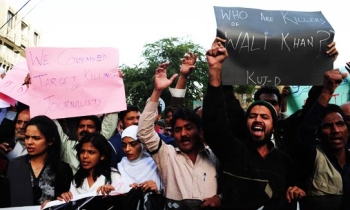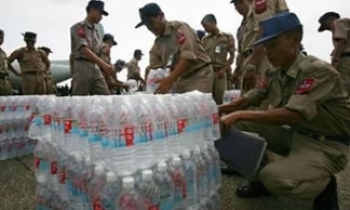In an appearance on CNN's Larry King Live Monday night, the network's chief international correspondent Christiane Amanpour passionately explained the difficulties TV journalists have in covering the conflict in Iraq.
The hour-long interview show was dedicated on Monday night to the plight of journalists who have met harm in the country, most recently ABC's Bob Woodruff and Doug Vogt, as well as Jill Carroll, an American journalist currently being held hostage in Iraq.
In the second half of the programme, King accepted calls from the public. One, which asked why there had not been more reporting about a US airstrike in Pakistan that unsuccessfully targeted a senior figure in al Qaeda, was answered by Amanpour who took the opportunity to explain the difficulty journalists face in accurately covering the war on terrorism.
"Well, certainly there's been a lot of reporting about it - perhaps not enough for that viewer, but as you know there's not enough international reporting on American television anyway," said Amanpour, who has worked at CNN for over 20 years. "But I think to the bigger point, why are we there? We're there because if we're not, whose word are we going to take for it? For instance, over the bombing in Pakistan, and for instance, over the constant atrocities in Iraq? Are we going to take the Pentagon-paid Lincoln Group, who are paying positive stories to be written in the Iraqi press? Are we going to take what the administration tells us?
"Do you remember at the beginning of this war, Donald Rumsfeld, [US] Secretary of Defence, told us that these insurgents were just a bunch of dead-enders who amounted to absolutely nothing? Well, that was three years ago... you remember on your [King's] own show, not so long ago, the vice president of the United States said that the insurgency was in its death throes... well. We're there to report what's actually going on, and we pay a heavy price for actually trying to get to the truth, and the truth is what our business is all about, and that's why we're out there despite the enormous, enormous personal cost, to us, to our families and to our networks."
Another question that asked why the cases of civilian media reporters are given more attention that the injuries suffered by American military personnel every day.
"That's a good question," said Amanpour as the caller from Ohio completed her question. "Well, I think it's an incredibly good question, the caller is absolutely right... but, the reason that the deaths and injuries of the American soldiers don't get as much publicity is because we are, by and large, banned from seeing it," she explained.
"The US government has made a decision that we are not allowed to see the coffins, that we're not allowed to see the burials, that we're generally, generally not allowed to go to any of the areas where there are wounded, US military hospitals... perhaps more in Landstuhl, perhaps more in the US, but it's very, very difficult to get close to that kind of real tragedy that the American servicemen and women are going through as well."
Amanpour was supported by CBS correspondent Lara Logan, who also appeared on the show alongside CBS Evening News anchor Bob Schieffer, CNN International anchor Michael Holmes, and veteran war reporter Peter Arnett.
"Well, I just want to say that Christiane is absolutely right. And on top of that, there's a real irony in the caller's question, because it's the military themselves that pressure us to not keep reporting the deaths of soldiers, not to focus on the deaths of soldiers and Iraqis every single day in this conflict," explained Logan. "They tell us, 'you don't tell the good news, you don't show the schools that are opening, you don't do this, you don't do that, why are you always focusing on the death'... and you try and say to them, it's because as a reporter I just feel like every time somebody else dies, I have a responsibility to make sure that that death wasn't in vain, that somehow, in some way, that it's acknowledged."
The state of international news coverage in the US is currently in the spotlight, with BBC World announcing just days ago that it plans to launch in the country. At the time of that announcement, Bill Goodwyn of Discovery Networks US - the company that will distribute the channel in America - said that US consumers are " ready for this unique news service - one that provides an impartial, global perspective on domestic and world events."
The US channel of Amanpour's own network now simulcasts an hour of CNN International every weekday at noon, but CNN International itself is only available on TV in the US in a few markets. CNNI is also available on the network's premium broadband video service, Pipeline, overnight in the week and most of the days on weekends.









